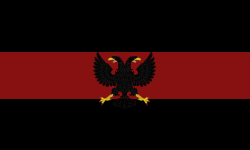History: Early Settlement and Strategic Isolation (2020s–2060s)
Vaygach Island, a harsh, remote land between the Barents and Kara Seas, remained sparsely populated through most of the 21st century. However, during the ecological and geopolitical shifts of the late 2020s, remnants of a radical ultranationalist group from Eastern Europe, driven underground after their movement was dismantled, fled north and clandestinely settled the island. These exiles, united by their ideology and seeking isolation, slowly built self-sufficient communities in the tundra under brutalist survivalist doctrines. Founding of Karpatovia (2073)
In 2073, these settlements consolidated under a singular banner: the People's Republic of Karpatovia. Despite the misleading use of “People’s Republic,” the state adopted a hardline fascist doctrine, glorifying ethnic homogeneity, militarism, and reverence for a constructed ancestral mythos. The founding leader, Marshal Alaric Drenov, established a one-party state under the Karpatovian Nationalist Party, enforcing strict autarky/isolationism, rigid social roles, and compulsory paramilitary service. Militarization and Cultural Engineering (2080s–2100)
Throughout the 2080s and 2090s, Karpatovia developed into a fortress nation. Drenov’s successors fortified the island with subterranean bunkers most of which are now abandoned, anti-air defenses, and a navy suited for Arctic conditions. Education became indoctrination, focusing on loyalty, sacrifice, and veneration of the Republic’s founding myth. A state cult centered on the ideals of Arctic purity and survivalism took hold. Foreign contact was virtually nonexistent. The Frost Era and Collapse of Autarky (2101–2110)
By 2101, climate volatility and resource depletion began to strain Karpatovia's self-sufficiency. The regime struggled to maintain energy production and food supply amid permafrost instability. Dissatisfaction grew beneath the surface, even within the ranks of the Vanguard. Pragmatists in the party saw that total isolation was unsustainable in the new geopolitical landscape, as Arctic trade routes and energy corridors became more central to global affairs. Reformation from Within and the End of Isolation (2111–2112)
A new generation of leadership, under Viktor Hargitai, seized control in a quiet internal purge and declared himself the eternal leader under state law. Hargitai, though still staunchly authoritarian and nationalist, adopted a more strategic vision. He loosened restrictions on external communication and began diplomatic overtures to neighboring Arctic and Asian powers. In 2112, Karpatovia formally ended its 39-year period of isolation. The same year, it joined the Commonwealth of Orbis. Present Day (2112)
Today, Karpatovia remains a tightly controlled fascist state with a population of 371,978. Its cities—grim concrete settlements like Drakovar, Karpatinsk, and Yarsk—are filled with concrete apartment buildings. The people endure harsh conditions, but enjoy increased stability and access to imported goods and food. While still feared by civilians of Karpatovia for its militarism and surveillance, Karpatovia is slowly evolving into a hybrid state: one that blends hardline internal control with selective external cooperation. |















